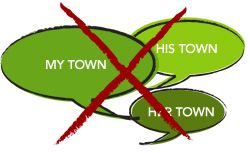 Is it too late in the game to call hyperlocal efforts a complete waste of time and resources?
Is it too late in the game to call hyperlocal efforts a complete waste of time and resources?
Business Insider comes close to convincing me that Patch, AOL's network of hyperlocal sites in 18 states, has little chance of succeeding unless it imitates Groupon and LivingSocial and enters the daily-deals business. Of course, imitating Groupon would not validate the hyperlocal-news idea; it would only validate the daily-deals idea, which needs no validating.
Business Insider insists that Patch can't possible justify the $120 million that AOL is investing a year because of the distance between its current traffic (4 million unique visitors in January) and the traffic it needs to become profitable. Comparing Patch to the Huffington Post, which AOL now owns, the Business Insider reports, "Even if Patch got to 25 million uniques and generated $100 million of revenue (2X Huffpo's per unique), it would still be losing money."
If we accept Business Insider's diagnosis of Patch as a business failure, will anybody step forward to make the case that the sites are a journalistic success? I've yet to read that piece. Even hyperlocal enthusiasts like Brian J. Manzullo, who has given the topic ample thought, backs away. One excuse frequently tendered on Patch's behalf is that even though it already has 800 staffers, it's still ramping up. Maybe Patch has a glorious future before it. Business Insider reports that AOL CEO Tim Armstrong says that some of the early Patches will soon be profitable.
Related in Slate
In 2010, Jack Shafer had lots of good things to say about TBD.com, the quasi-hyperlocal site in the Washington area.My local Patch isn't terrible, but I visit it primarily out of professional duty. As much as I hate to extrapolate my own narrowness onto other people, I'm convinced that Web users are more interested in hypercoverage of their interests?sports teams, hobbies, food, vacations, family, games, et al.?than they are of the starving-artists exhibition at the farmer's market, increasing parking-meter rates, the city budget, local real estate prices, or many of the other topics covered in Patch.
Besides being wildly expensive to create, hyperlocal news doesn't seem to appeal to a broad audience. Or, to argue on safer grounds, the current wave of hyperlocal news has yet to summon huge audiences. Hyperlocal proponents say users crave engagement, which is true. But users seem to be voting with mouse clicks to engage the world through Facebook, Yelp, Twitter, and other forms of social media instead of sites like Patch. And even old-school mediums such as email, listservs, and texts often convey information more hyper than your average hyperlocal site.
In other words, social news trumps hyperlocal news.
Hasn't it always been so? We're always more interested in what our friends and family are doing than we are about plans to add a curb-cut to a neighbor's property. Besides, for users who tune their Facebook accounts to include neighbors, schools, curmudgeons, and other sources, they get a stream of hyperlocal news in addition to the usual social news they desire. And because they know many of those sources, they're able to assess the truth value of that "news."
I can't imagine many users abandoning Facebook for Patch, no matter how good Patch becomes, in part because the sites overestimate the affinity people have for the geographical territories defined by their local Patches.
Clicking around various Patches, I get the impression that the Patch concept isn't to push hyperlocal news but to push (ultimately, at least) hyperlocal advertising. There's nothing wrong with steering news audiences to advertisers. Great newspapers, magazines, and TV news programs do it. Slate does it. But Patch's blandness and thinness convinces me that, to paraphrase Bruce Schneier,* Patch users aren't the customers, they're the product. The real customer is the advertiser, even though advertisers haven't flocked to the sites yet. Of course, you're the product on Facebook and Google, too, but they do a better job of masking it. The Patch presentation succeeds in being advertorialish and amateurish at the same time, which I find off-putting.
Almost a year ago, the Poynter Institute's Rick Edmonds expressed why hyperlocal sites don't engage him: News consumers, he posits, tend to like "big stories," the earthquake, shootings, bombings, floods, political scandals, and economic upheavals that fill our daily newspapers and cable-news channels. "I have a hard time, though, recalling a neighborhood story I wish I had known about right away," Edmonds writes.
That's something nobody ever says about their Facebook feed.
******
This story idea was brought to you by Slate's Michael Newman, who bears no blame for its execution. Get hyper with email to and local by sampling my Twitter feed. (Email may be quoted by name in "The Fray," Slate's readers' forum; in a future article; or elsewhere unless the writer stipulates otherwise. Permanent disclosure: Slate is owned by the Washington Post Co.)
Track my errors: This hand-built RSS feed will ring every time Slate runs a "Press Box" correction. For email notification of errors in this specific column, type hyperlocal in the subject head of an email message, and send it to
*Correction, June 28, 2011: The original version of this piece misspelled Bruce Schneier's last name.
Like Slate on Facebook. Follow us on Twitter.
Follow Slate's?Press Box
Source: http://feeds.slate.com/click.phdo?i=ed379d1b1deafb31074dbb84a3111332
republican debate gabapentin university of phoenix army wives dallas morning news myanmar henry kissinger
No comments:
Post a Comment
Note: Only a member of this blog may post a comment.